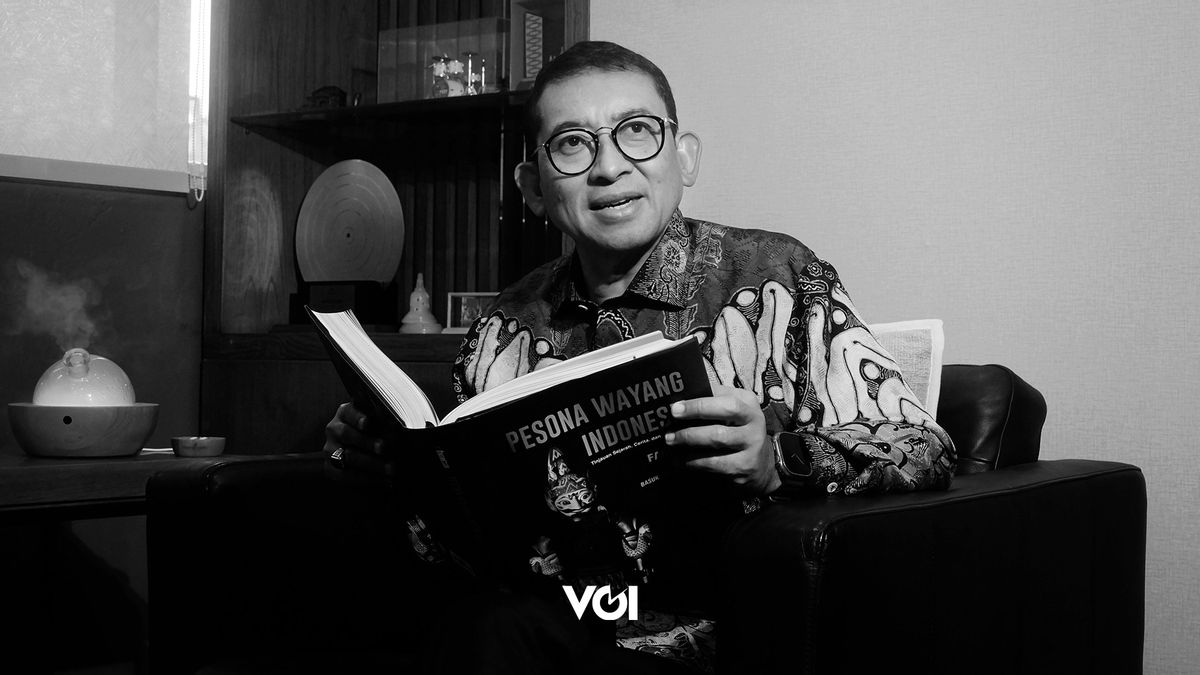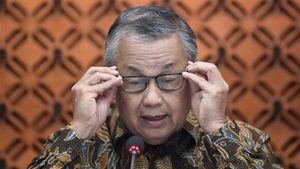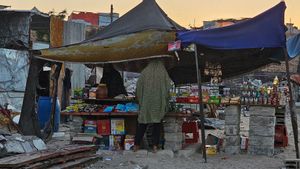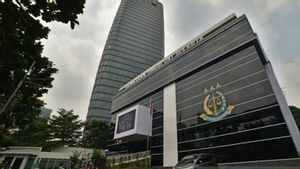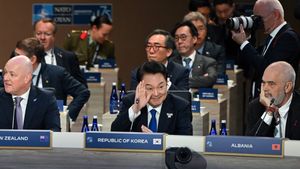The presence of the Ministry of Culture is President Prabowo Subianto's commitment to make culture more powerful. So far, according to Minister of Culture Fadli Zon, this nation has not glorified its own culture enough. The Power of Culture must be truly implemented for broader interests.
***
One of President Prabowo's directives to Fadli Zon, who was given the mandate to become Minister of Culture after previously joining the Ministry of Education, Culture, Research, Technology, and Higher Education, was to strengthen the role of culture. "This Ministry of Culture is a commitment from Mr. Prabowo to create his own ministry separate from the existing Ministry of Education. This is important so that culture becomes one of the directions in national development," he said.
At the G20 Minister of Culture meeting forum in Salvador da Bahia, Brazil, recently, Fadli Zon and his colleagues, the Ministers of Culture of the G20 countries, also discussed the importance of the role of culture in development. The Power of Culture for the progress of a nation. He also intensively held bilateral meetings with the Ministers of Culture of India, Germany, South Korea, and South Africa.
Culture, continued Fadli Zon, must be able to be a tool for diplomacy. As a country rich in culture, this must be optimized. "Culture is soft power, the power of culture as a tool of diplomacy is very important. Cultural products are produced from the heart. And what is produced from the heart will penetrate the heart too. So it will be easier to appreciate and accept,” he said.
Because of the importance of culture, Fadli Zon also focuses on efforts to maintain and preserve culture. “Like it or not, culture must also have a contemporary touch. We must adapt. Data, artifacts, manuscripts, and all of our culture must be digitized, so that all Indonesian people and citizens of the world can enjoy them,” he said to Iqbal Irsyad, Edy Suherli, Bambang Eros, Irfan Meidianto, and Dandi Juniar from VOI who met him at the Ministry of Culture office on Jenderal Sudirman street, Jakarta, recently. Here is the full excerpt.

When compared to around 100 countries that Fadli Zon has visited, he sees no country that has a culture as rich as Indonesia. (Photo: Bambang Eros, DI: Raga Granada VOI)
The Ministry of Culture is a new ministry, a spin-off from the Ministry of Education, Culture, Research, Technology and Higher Education. What are President Prabowo's specific duties and roadmap?
The Ministry of Culture is a commitment from Mr. Prabowo to create his own ministry separate from the existing Ministry of Education. This is important so that culture becomes one of the directions in national development. And this is actually the mandate of Article 22 of the 1945 Constitution, then Law No. 5 of 2017 concerning the Advancement of Culture, the Cultural Heritage Law, the Film Law, and others. Through the Ministry of Culture, the government can facilitate the cultural ecosystem for cultural actors.
In addition, there are also efforts to preserve and protect cultural heritage through our museums. Then cultural diplomacy, cultural promotion, and utilization of culture through film, music, performing arts, traditional arts, to adherents of beliefs. We will also create basic cultural data. Existing museums, both those under the ministry, provincial government, district/city government, and those attempted by the private sector, can move up a class. The number is around 500. We want to make this museum a place of literacy and education for the community.
How is the division of work with you and the Deputy Minister of Culture?
We work together as a team, including the Deputy Ministers, Directors General, and all levels to implement existing programs.
You just returned from the G20 Ministers of Culture meeting in Brazil. What was the outcome of that meeting?
The G20 Ministers of Culture meeting discussed the importance of culture in development, the power of culture. In addition, I also held bilateral meetings with several Ministers of Culture from countries such as India, Germany, South Korea, Brazil, and South Africa regarding issues related to Indonesia.
With India, I discussed the repatriation of the Pucangan Inscription, an important inscription from the era of King Airlangga. With Germany, I also discussed the repatriation of our artifacts stored in the Steinsburg Museum, Germany, including fossils of ancient Indonesian humans. If they can be repatriated, this can complement the knowledge of Indonesian prehistory.
I also spoke with the Minister of Culture of South Africa, because there are many Indonesian diaspora there. In Cape Town, the number of Indonesian diaspora is quite large, around 2.7 million people. They come from the era of Sheikh Yusuf, as well as before and after. With the South Korean Minister of Culture, I learned about their pop culture that has successfully explored various parts of the world and dominated various corners of the world.
Are there quite a lot of souvenirs that can be implemented domestically?
Yes, quite a lot. This is part of networking and cultural diplomacy.
Indonesia has cultural diversity. What concrete steps has the Ministry of Culture taken to ensure the preservation of traditional culture in this digital era?
Like it or not, culture must get a contemporary touch. We must adapt. Data, artifacts, manuscripts, and all our cultures must be digitized so that they can be enjoyed by all Indonesian people and citizens of the world. The digitization of museum collections and cultural heritage needs to be disseminated to the Indonesian people, especially the younger generation, millennials, Gen Z, and others, so that they know and appreciate our culture. This is an important part of the effort to reintroduce Indonesian culture to the younger generation. One way is through the digitization of our cultural materials.
What has this digitization program been like so far?
So far it has existed, but it has not been maximized. With the existence of this Ministry of Culture, we want to maximize digitization efforts. Including neat data collection for easy public access. The effort must be disseminated, disseminated to the public. Our cultural expressions and richness from Sabang to Merauke must be documented and widely disseminated.

As Minister of Culture, in the Red and White Cabinet led by President Prabowo, Fadli Zon emphasized the importance of utilizing the power of culture. (Photo: Bambang Eros, DI: Raga Granada VOI)
With many cases of Indonesian culture being claimed by other countries, how does the Ministry of Culture ensure the protection of Intellectual Property Rights (IPR) for local culture?
This is one of our big homework assignments. Efforts start from collecting strong data, even if possible with geographical indicators to provide more accurate details. We will also work with the Ministry of Law to patent and register our intellectual property and culture.
In fact, in neighboring countries such as Malaysia, many Indonesian diaspora are actually the perpetrators of these claims. They come from Java, Sulawesi, Sumatra, and others. Our biggest challenge is to ensure that cultural appreciation in our own country is better than appreciation by outsiders.
Is there a list of cultural property that needs to be protected with patents?
We have recorded more than 2,200 intangible cultural heritages. Of that number, around 13 have been registered with UNESCO, including keris, wayang, batik, noken, saman dance, Balinese dance, herbal medicine, gamelan, and pencak silat.
In 2025, we plan to register three additional cultures: reog, kebaya, and kolintang. We hope that the registration process will run smoothly so that it can be recognized as a world cultural heritage by UNESCO.
Culture can be a powerful diplomatic tool. Does the Ministry of Culture have a program to introduce Indonesian culture globally?
Culture is a very effective soft power as a diplomatic tool. Cultural products that are born from the heart can touch the hearts of others, so they are more easily appreciated and accepted.
Indonesia has extraordinary cultural wealth. I have visited around 100 countries, and none is as culturally rich as Indonesia. Our country could be the cultural capital of the world. Unfortunately, this potential has not been utilized optimally. Our task is to tell the world about Indonesia's cultural wealth because culture is one of our national treasures.
How can culture be valued to generate economic benefits?
We must build an ecosystem that supports culture as a productive sector. If this ecosystem is formed, culture will absorb a lot of labor and stimulate the tourism sector and the creative economy. Culture is not a cost center; in fact, culture can make a major contribution to national development.
Many tourists come to Indonesia because they are interested in our culture, in addition to its natural beauty. Therefore, synergy with related ministries and institutions is important to create an ecosystem that supports cultural development.
Are there any efforts to protect the culture in remote and underdeveloped areas?
We have a cultural advancement village program and a cultural village that aims to protect and advance local culture. The active role of the community is highly expected in this activity, because local communities are the spearheads of cultural advancement.
The younger generation, especially millennials and Gen Z, need to be involved in this effort. With technological advances, they are often more familiar with foreign cultures than Indonesian culture, which is certainly a big challenge for us.
Are there any plans to introduce a stronger cultural curriculum in schools or universities?
Since schools are under the Ministry of Primary and Secondary Education, and universities are under the Ministry of Higher Education, Science, and Technology, we will establish synergy across ministries. This collaboration aims to instill the importance of culture in the younger generation, both through primary, secondary, and higher education.
Regional languages and scripts are increasingly being eroded. What is the Ministry of Culture's plan to support the preservation of local languages and scripts amidst the development of foreign languages and digital?
This is also an important concern, because it is included in the objects of cultural advancement. Manuscripts, scripts, and regional languages, especially in remote areas, are now threatened with erosion. All of this is part of our cultural wealth that must be preserved. We plan to work with communities and associations that care about this field.
After several weeks of serving as minister, what obstacles have been found in the field?
There are definitely obstacles, especially because we are a new ministry. Internally, the main challenge is the preparation of administration and organizational governance. Meanwhile, we are also preparing various cultural programs. For now, we are optimizing what already exists.
We have also held a hearing with Commission X of the Indonesian House of Representatives, hoping that they will approve sufficient budgeting for the Ministry of Culture. We are optimistic that with greater funding support, our mission to advance culture can be realized more quickly. Don't forget, the power of culture is very important.
From the working meeting with Commission X of the Indonesian House of Representatives, have there been any directives regarding the disbursement of larger funds for the Ministry of Culture?
In the first working meeting with Commission X of the Indonesian House of Representatives, as our working partner, they were very supportive and welcomed the existence of the Ministry of Culture. We hope that this support will continue to strengthen cultural programs.
In the era of social media, does the Ministry of Culture have a strategy to use digital platforms to spread Indonesian culture?
Social media is one of the effective means to communicate with the public. We will optimize social media to advance culture and socialize various ministry programs. Currently, around 220 million Indonesians use social media, so this platform has great potential for disseminating cultural products, promoting activities, and establishing synergy between parties.
Will we collaborate with influencers?
Yes, that is one of the strategies. Especially influencers who have a large mass base. In addition, we will also work with community leaders and various institutions to socialize the Ministry of Culture's programs.
What are the main targets that you want to achieve during your tenure, especially regarding the preservation, utilization, and increasing appreciation of Indonesian culture?
Our target is that all Indonesian people have pride in their national culture. We want to instill a love for local culture so that it becomes awareness, lifestyle, and ultimately forms the character of the nation. This is part of Nation and Character Building or an effort to build national identity.
We hope that the planned programs can get support from various parties. Synergy and cross-sector cooperation are very important, because this task is not only the responsibility of the Ministry of Culture.
Fadli Zon Reveals His Closeness with Prabowo

Among President Prabowo's cabinet ministers, Fadli Zon is one of those who has a close relationship with Prabowo Subianto. In fact, the relationship has existed since he was a student at the University of Indonesia. (Photo: Bambang Eros, DI: Raga Granada VOI)
Fadli Zon's introduction and closeness to Prabowo Subianto began when he was invited to be a speaker in a discussion at the Center for Policy and Development Studies (CPDS). Prabowo is one of the founders of this institution. Since then, Fadli has often been invited to discussions, breakfasts, and various other activities.
As a student activist, Fadli Zon is not only busy with his studies, but also cares about the conditions around his campus, the University of Indonesia.
"Before becoming a student, I had started a career as a journalist. When I was a student in 1991, I was still active as a journalist and writer. This was part of an effort to support myself," said the man born in Jakarta, June 1, 1971.
Fadli has led several UI student demonstrations. From his experience as a student activist, he even wrote a book about the reconstruction of the student movement in the 1990s.
"After the 1960s and 1970s, and after the NKK and BKK, the student movement was like in a coma. I tried to provoke polemics about the student movement in the 1990s. When the discourse was rolling, I became a resource person in various places," he said.
One of them was when he became a speaker at a study institution founded by Prabowo, the Center for Policy and Development Studies. "I was invited there (CPDS), and I invited students to discuss the student movement in the 1990s," he explained.
It was at that institution that Fadli first became acquainted with Prabowo, who is now the number one person in this republic. "That was when I first became acquainted with Mr. Prabowo. Since then, I have often been invited to discussions, breakfasts, and so on. Finally, our relationship became close," said Fadli Zon.
Involvement and Become Executive

Ministry of Culture said Fadli Zon is a commitment from President Prabowo to advance culture. (Photo: Bambang Eros, DI: Raga Granada VOI)
Because of the intense meetings and discussions, Fadli Zon was not just a guest. He was trusted to become one of the executive directors at CPDS.
“I was then trusted to become the Executive Director at CPDS. At that time, I was still a student. Until he became the Commander of Group 3 Kopassus, Deputy Commander of Kopassus, Commander of Kopassus, Danjen Kopassus, and Sesko TNI, I was still involved,” he explained.
When Prabowo lived in Jordan and Malaysia, Fadli continued to communicate with him intensively. “I met him several times in Jordan. Up to six or seven times I went there bringing a number of figures to meet with Pak Prabowo,” he said. “When Mr. Prabowo was in Malaysia, I came to see him almost every month. So, my relationship with him is quite close,” he added.
For Fadli, Prabowo is a figure with big ideas. “I see that Pak Prabowo is a person with big ideas. His nationalism is high, and he really appreciates young people. At that time, I was still a student,” he said.
During intense interaction, Fadli had already guessed that Prabowo would one day become a great leader. “I am sure that Mr. Prabowo has a mission, even though the path is very steep. He had to face various slanders. From a rising star, then fell. However, he rose again,” he explained.
Prabowo lost several times in the election, but remained enthusiastic. “He then built a political party (Gerindra). In the presidential election contest, he lost many times, but with determination and a strong desire to build Indonesia, he persisted. In my opinion, this is God's way if he finally gets a mandate from the Indonesian people to become president,” said Fadli.
What Has Not Changed About Prabowo

As Minister of Culture, Fadli Zon brought souvenirs from the G20 Culture Ministers' Meeting which he attended recently in Brazil. (Photo: Bambang Eros, DI: Raga Granada VOI)
One thing that according to Fadli Zon has never changed about Prabowo is his ideals. "What has not changed is his ideals to advance the nation. His ideals to make Indonesia strong," he explained.
According to Fadli, Prabowo wants Indonesia to be strong. "Indonesia must become an Asian tiger. Indonesia must become a developed country with increasing people's welfare," he said.
In accordance with Prabowo's ideals, he targets good economic growth in Indonesia. "Mr. Prabowo wants Indonesia's economic growth to continue to increase. The target is economic growth of 8%. Children can eat nutritious food, can study in good schools," he said.
Meanwhile, the people in general must be able to access hospital services. "He wants everyone to be able to get access to good hospital services," he added. "That has been his ideal since long ago," explained Fadli, while praising Prabowo's way of strengthening relations between cabinet members through a special event in Magelang.
According to Fadli, Prabowo's ideals are in line with the founders of this republic. “Especially the closest is to Bung Hatta’s ideals. According to Bung Hatta, we are independent to achieve the happiness of the people. How the people have enough food, clothing, and shelter. If they are sick, they can go to the hospital. When they are old, there is a guarantee of old age. So, living in Indonesia is not in vain,” he said.
Regarding how the people can prosper, Prabowo Subianto is currently working on it. “He always says how to make the little people smile,” said Fadli Zon.
"Culture is soft power, the power of culture as a diplomatic tool is very important. Cultural products are produced from the heart. What is produced from the heart will penetrate the heart too, so it is easier to appreciate and accept,,"
The English, Chinese, Japanese, Arabic, and French versions are automatically generated by the AI. So there may still be inaccuracies in translating, please always see Indonesian as our main language. (system supported by DigitalSiber.id)
